It’s time for some mythbusting around the increasingly popular myth that the TWO FACE series, and TWO POLLYANNAS in particular, is all about running Shan’ann Watts down. The writing is biased; Chris Watts is hero worshipped and Shan’ann deserved what was coming because of the way she treated him.
It’s not true.
It’s not even close to the premise of TWO POLLYANNAS. In fact the title doesn’t refer to Chris Watts or Shan’ann whatsoever. TWO POLLYANNAS is about the two poor little girls at the center of the tragedy, who have been overlooked in almost all coverage.

Even so, the TWO POLLYANNAS title doesn’t refer to them either. It’s a much deeper narrative than that.
It shouldn’t even be necessary to say this, but I’ll say it anyway.
In true crime without exception no one deserves to die! The very reason we’re here trying to figure out what happened is because of a criminal act that has shocked us to the core, and we want to know why.
Even when we begin to find answers to why, that doesn’t mean we’ve found out that they deserved to die. Why is about motive. It’s why the murderer committed murder!

If anyone didn’t deserve to die in this story it was Bella and Ceecee. Who were they? Didn’t their little lives matter? What were their personalities like? Who were their friends? What impact did they have on their parents as a unit, and on each parent individually? So that’s the perspective TWO POLLYANNAS takes.
What did the Watts household feel like from the inside, how did it operate, and what was it like to experience it? Well, we get that from the perspectives of Bella and Ceecee. TWO POLLYANNAS attempts to show what it was like being them behind closed doors and between Live posts to Facebook.
In every true crime case I’ve made an attempt not just to understand the merits of the crime and the case, but what was going on with the victim, the perpetrator and the true dynamic that existed between murderer and victim. Who were these people really, in life?
So, over the course of several narratives in a series, the issues of all the characters will need to be addressed, and addressed equally. So trying to fathom family dynamics isn’t about blaming anyone, it’s about fathoming family dynamics.
Family dynamics are difficult to get to, and they’re especially so when families won’t come forward and be 100% clear about what was going on. Also, some families will reveal more about their relatives, others will reveal less. It’s up to us then to look at what’s being withheld.
In the the Watts case in particular, the family dynamics isn’t speculation because we’re in the unique position to have a trove of Facebook videos in the public domain showing all four family members repeatedly interacting with one another. It doesn’t take long for behavioral and personality patterns to emerge. Access to them is one thing, but what do they mean?
https://youtu.be/FVvyQkdy7NM
What if it means that beneath the veneer of a fairy tale on Facebook, the Watts family weren’t quite as happy or functional as they appeared? This sounds like heresy, and some people are aghast to hear it. What? Cracks in the marriage? How dare you! But we do dare, because of the way the family was annihilated. Looking at the fairy tale isn’t the full story for why this crime happened. Looking into the cracks may reveal why it fell apart.
But some people just don’t like that. They want the fairy tale, and part of it is that Chris Watts had to be all evil, and his wife and children all good. Sadly, real life just isn’t like this because – guess what – no one is perfect.
One of the worst reviewed series I’ve written thus far is on the Steven Avery case. People absolutely hated the FOOL’S PARADISE books because it didn’t agree with the popular and mainstream premise in Making A Murderer that Steven Avery and Brendan Dassey were both framed, and as such innocent victims. There is an inverted fairy tale about murderers as innocents. In that story, people want to believe Avery and Dassey are innocent so that their own perceived victimhood is real.
If the innocence story is a fiction, however, then their victim story is a fiction too.
Unfortunately for those bleeding hearts who are desperate about proving Avery’s and Dassey’s innocence, they weren’t framed, and whatever you may think of Making A Murderer’s Sympathy Narrative [also known as True Crime Apologia in the mold of Paradise Lost], however strongly you may feel for Avery, the question around his guilt or innocence is by no means a mystery.
The law, evidence, and let’s be clear – common sense – produces a very different result to Avery’s and Dassey’s guilt than the payoff from the emotional story. That’s why the outcome of the case feels different to the conventional, popular wisdom. But true crime is more than about feelings, it’s about real people, real destruction of lives, real emotions and real reality. That’s the true in true crime.
In the Jodi Arias books, most readers wanted a black and white narrative where Travis Alexander was portrayed as the innocent victim whereas Jodi Arias was sketched as monstrous, and as a hideous murderess.
It should be obvious by now that to say Jodi Arias [or any convicted criminal] is guilty and a disgusting liar and a horrible human being isn’t only stating the obvious, it’s self-evident. How much time do we spend name-calling criminals before we get to the business of dealing with their cases and uncovering the full extent of their lies?
If name-calling and dancing on their graves is all we want to do, then do it, get it over with but don’t confuse that with research or reading or analysis. If you want to feel good about how bad someone is, if you love to hate, spend your time getting your kicks on social media. Every time someone says “monster”, “narcissist” or “psychopath”, like or retweet it, and that’s all the true crime effort you need to “understand” a case.
On the other hand, if you’re more serious about figuring out motive and method, the why and how of these crimes, then climb aboard the Rocket Science rocket and let’s see what we can find out. That’s different. That’s an intellectual journey.
Why would one work on a narrative fixating on the obvious [guilty! psychopath! evil monster!] unless to gloat about someone’s badness and rage about the victim’s goodness. Rocket Science is more sophisticated than that, alas. It tries to do the simple but supremely difficult thing of figuring out the more difficult stuff; why crimes happen, and who the people are that are involved. That’s all.
It’s because of the above that these three reviews below of TWO POLLYANNAS ring false. It’s not enough to shoot down the analysis [because it’s not sufficiently pro Shan’ann, or anti Watts], the writing itself must be seen as a cynical and dishonest effort to make money.
In the first review the indignant reviewer can’t even spell the name of the victim correctly.
I’ve read a lot of Nick’s books and I usually really enjoy them, especially all his books about the JBR case. This book left me with an uncomfortable feeling. I got the distinct sense that he is blaming Shannon for her own murder – as if she was so controlling and impossible to live with that she had it coming. How can he presume to know this so well if indeed it was true – and how does that justify what Chris Watts did? Simply a shocking road to take in my opinion, but in the end I guess it’s all about making money and selling books. Glad I read it for free.
The reason I resent schizophrenic reviews like this, is that they’re from regular readers who ought to know better. They ought to know by now that every aspect of the case is examined – the good, the bad the ugly. That they wish to conveniently pick and choose their truth based on their own bias is especially out of place in true crime.
A lot of time was spent talking about how Shanann was racking up debt while Chris was working hard at his job. It repeatedly mentions her OCD, illness, and time spent on social media in a negative way. This was not just done from facts, even if the author would like you to think it was. The author seemed to be blaming her for a lot of the pressures on Chris…
This review is better, but it ignores the fact that effectively Chris Watts was for all intents and purposes the sole breadwinner in the household. If you buy into the MLM farce that Shan’ann was truly Thrivin’ and bringing in an income, I can see how you might find difficulty – and discomfort – with that assessment.
All the credit cards in the Watts household were maxed out, not because they were making enough money, but because they weren’t. The bankruptcy filing is adamant that there was only one source of income in the Watts household [in 2015], and the little money Shan’ann was bringing in was about to be diminished by her second pregnancy. In 2018 the credit cards were still maxed out, and now she was about to have a third child.

The health expenses in the Watts household were all on the one side. Chris Watts had seemingly no medical issues or expenses, hell, he even exercised at home in a homemade gym.
What surprised me in researching TWO POLLYANNAS wasn’t just Shan’ann’s medical circumstances, but the children’s too. Both children were quite sickly. This assessment, which was researched prior to the release of the Discovery Documents, has since been confirmed by them.

Fact is, one of Shan’ann’s surgeries [to her neck] cost over $100 000. Who was going to foot the bill for that? Putting aside for a moment everything else, the mortgage, the crippling credit card debt, the school fees at Primrose – if your partner had medical expenses of $100 000, and it was your job to pay for it, how would you feel about it?

The actual state of the Watts family finances, even after the release of all the information, still remains a mystery.
And then there’s this.
Not only has the author nothing nice to say about a murdered woman and her children, what he says is simply not true. This isn’t true crime writing: it’s true fiction masquerading as true crime.
True crime isn’t about having good things to say about anyone. It’s about analyzing evidence and seeing what that has to say. If you disagree, and you may, well that’s another story, but are you disagreeing from a position of strength from an informed position, or weakness, based on little more than an emotional position?
The coverage on CrimeRocket is an extension of what goes into the written narratives. How much of the coverage on this site [out of 10] would you say is fictional, speculative, biased or not true?
Buy the TWO Face series at this link.







































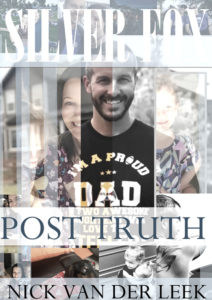
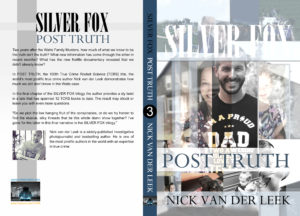
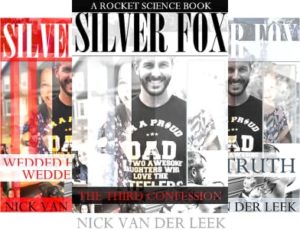
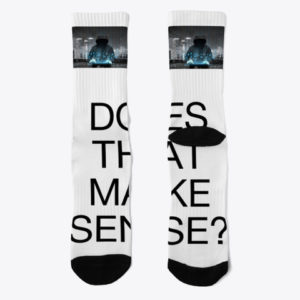
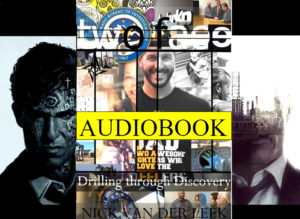
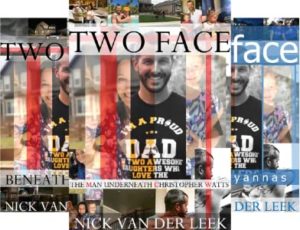

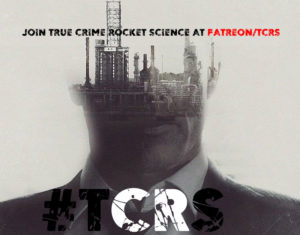
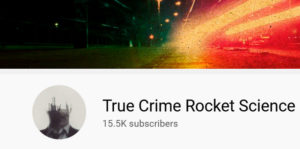
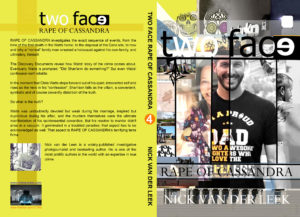
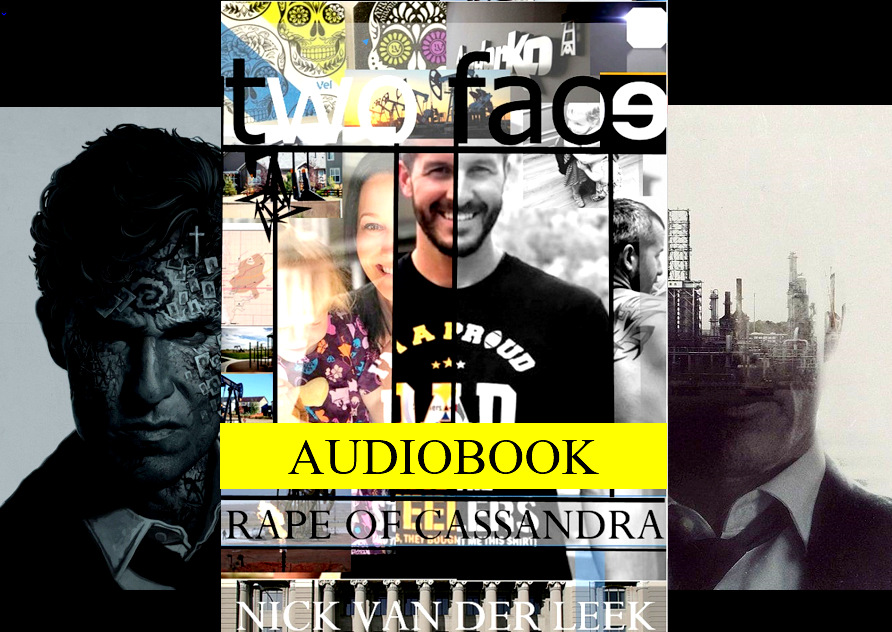
Recent Comments